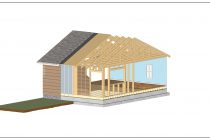Introduction
Are you chemically sensitiveor do you know someone else who is? If you are and if you’re looking for a new home, here is a list of criteria that you and your real estate agent should have in mind when you look at homes to buy or rent. You can also discuss these points with the prospective seller of a home you might buy or the property manager of a potential rental unit.These suggestions will help you avoid some of the common pitfalls that MCS people encounter. It is better to avoid these problems ahead of time than to try to remedy them once you are in the home.
This list is by no means complete, nor entirely effectual. It does provide a solid starting point for determining your search criteria.
- The home should preferably be older than 15-20 years. This usually means it will not have plastic vapor barriers in the wall that can trap moisture and cause mold.
- Hardwood floors are best. If carpeting is present, it cannot be newly installed and it should be in relatively good condition. You can have carpeting cleaned using Zero Rez. To find a local franchisee in your area, click here (866-937-6739). They use no chemicals or soaps and instead use high-pressure water.
- The interior (and exterior) of the house should not have been recently painted, even for “touch-ups.” Also no recent remodeling, including new flooring.
- Absolutely no recent application of pesticides or insecticides. Contact Biocontrol Network for non-toxic alternative approaches (800-441-2847).
- You should make it clear to the seller or the property manager of a rental that you will provide allcleaning supplies or that you or someone you know will do the cleaning. They should not do any of the cleaning, even if they assure you they will use non-toxic materials. Too many times what is considered “non-toxic” to them can be intolerable to you.
- The house should be devoid of any noticeably visible mold or water leaks. There should also be no recent history of water intrusion, leaks or mold treatment, particularly with traditional fungicides.
- The house must have good rooftop rainwater drainage around the foundation. The gutters and downspouts need to be in good working order. The downspouts need to draw rainwater away from the foundation. The soil right around the foundation needs to slope away from the foundation or at least be flat. No sloping of the ground towards the foundation, which causes pooling of rainwater against the house. Good rooftop rainwater management is the single most important thing you can do to help insure a dry basement, which will help keep the mold levels down throughout the house.
- The house should have no “knob and tube” wiring, particularly in and around the bedrooms.
- The house should be located well away from overhead high-tension electric power transmission lines. Also, the house should not be located directly under electric distribution lines. If possible, check the magnetic field exposure levels in the house, particularly in the bedroom, with a Gauss meter. You can purchase the Gauss Master for approximately $35 from Less EMF (518-432-1550; 888-537-7363). The levels should be at least below 2 milliGauss, but ideally be below 1 mG.
- The house should be located away from all major roads and highways.
- The house should be located well away from industrial factories, dry cleaning plants, auto service stations and other sources of air pollution.
Links to Websites with Useful Information on Chemical Sensitivities:
Chemical Injury Information Network
A resource for and by Chemically Injured individuals.
Founded by William Rea, MD. A world renowned center for the diagnosis and treatment of environmental illness (EI). Located in Dallas, Texas; (214) 368-4132.
A complete website on the dangers of pollutants and toxins in the home, and their effects on your health. Has one of the most complete links pages on the web on resources for chemical sensitivities.
Oram Miller, BBEC, EMRSis IBE’s Director of Learning & Development, a position created expressly to take the fullest possible advantage of his skills, his passion, and his dedication to our institute and its students, and to educating the public at large. Based in Los Angeles, Oram provides on-site healthy home and office evaluations for clients throughout Southern California and nationwide. Oram also consults on the healthy design and construction of new and remodeled homes. He is co-author of “Breathing Walls,” featuring protocols for the design of a healthy new or remodeled home without mold or chemical outgassing. His website is www.createhealthyhomes.com.


